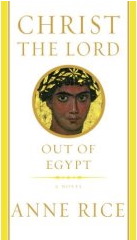The Restoration of Anne Rice

And I'll also admit that, in light of this blog entry's subject, that I've only read one Anne Rice novel, Interview with the Vampire. I read it when I was in seventh grade, and it was probably a bit too mature for me at the time, but that was true of a lot of books I had my hands on back then [sigh]. I later saw the movie adaptation with Tom Cruise that was released a little over a decade ago, but I don't remember a whole lot about the movie. However, there are particular scenes from Rice's book--which I read 25 years ago--that stand out quite vividly. I suppose that is testimony to her God-given ability to tell a story, and to tell it well.
Anne Rice's return to the Christian faith of her childhood is not a brand new subject, but it is still recent enough that it makes me raise my eyebrows in amazement. Cindy Crosby has written a fascinating article at christianitytoday.com chronicling Rice's life and recommitment to her Catholic roots, including her new book, Christ the Lord: Out of Egypt. Be sure to read Crosby's article, "Interview with a Penitent," in its entirety, but below are a few highlights that jumped out at me.
On Rice's Return to the church:
In 1998, she came to a crossroads. "I realized I didn't have to find the answer to every question or know who was right on every issue. All I had to do is to love and do my best. The rest he would help me work out."
The tipping point for Rice was a longing to take Communion. Catholics believe Christ is present in the sacraments—that they are his body and his blood. Rice called Troxler, asking, "Will they take me back?"
Troxler assured her the answer was yes. Rice went to see a priest, to whom she made her confession for two hours. She discussed her writing in depth, her personal failings, and her hopes for a better life. Although her husband Stan's atheism had not changed, he readily agreed to be remarried in the Catholic church.
The role books and Christian scholarship played:
She read obsessively: John A. T. Robinson, Augustine, D. A. Carson, Jacob Neusner, Luke Timothy Johnson, Craig L. Blomberg. Slowly, the historicity of the Resurrection became hard to deny. "Christianity achieved what it did," she says, "because Jesus rose from the dead."
Rice had long conversations with Troxler, who had once studied to be a nun. They read passages from the Bible to each other, as did Anne and her sister Karen. Rice's questions intensified. "The Lord came looking for me," she remembers. "Everywhere I turned, I found images of the Lord and his love."
Rice spent a lot of time sitting cross-legged in her room, her back to the bookcase, surrounded with books. Eventually, she says, "I read myself right back into faith."
That's an extremely wide range of viewpoints, no matter how you look at it: Protestant, Catholic, and Jewish; conservative and liberal; evangelical and mainline; historical and contemporary. Rice is to be commended for her breadth of study.
Rice's surprise (in researching her new book) at the level of skepticism among some New Testament scholars:
"I wasn't prepared for the cynicism or bias against Jesus in biblical scholarship," Rice says. "I didn't know about the rancor in scholastic circles. People have built entire careers on tearing the gospel to pieces. I wasn't prepared for the degree of acid and vitriol … credentialed scholars from universities saying there was no Virgin Birth or [Christ] never walked on water.
"I've studied a lot of history. Sound historians don't make statements like this. But some New Testament scholars do."
Her statement immediately above speaks volumes. Welcome to my world.
Rice's assessment of N. T. Wright:
As she researched the New Testament, Rice was particularly impressed by N. T. Wright, the prolific bishop of Durham and the author of The Resurrection of the Son of God.
"I was blown away by the fact that he accommodated all the skeptics and did it with generosity," Rice says. "He referenced their books and arguments and answered in his own brilliant, patient way and still maintained that Jesus rose from the dead. I had dreamed of this sort of scholarship."
On whether she will ever write another another vampire novel:
About her previous subjects, Rice says, "I would never go back, not even if they say, 'You will be financially ruined; you've got to write another vampire book.' I would say no. I have no choice. I would be a fool for all eternity to turn my back on God like that."
There's much more about Rice's spiritual journey and her new book in the article by Crosby, and I commend it to you. I realize that a number of you reading this whom I know personally are not Catholic and you may just shrug your shoulders at Rice's faith. However, personally, I believe that I would have more in common with a Catholic who takes her faith seriously than a Baptist who is one in name only. And yes, some of her views described in the article are questionable, but I would like to think that Rice, like all of us, is still in process of transformation (Rom 12:2)--becoming more like Christ. The title of her new book, Christ the Lord, carries great significance as well. Based on her wide study described above, I have no doubt that such a title was intentional.
If anything, Rice's journey of faith, loss of faith, and restoration to faith fulfills the wisdom in Proverbs 22:6, "Teach your children to choose the right path, and when they are older, they will remain upon it" (NLT).









